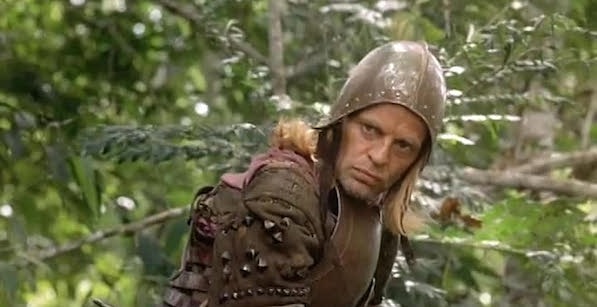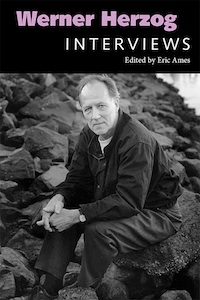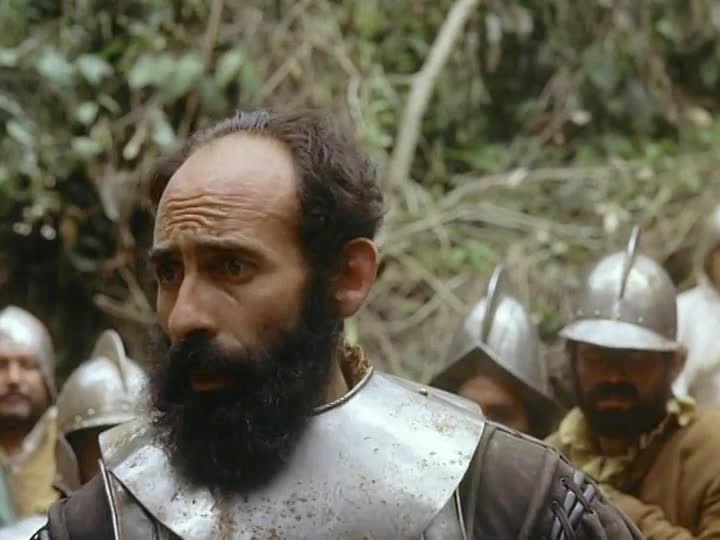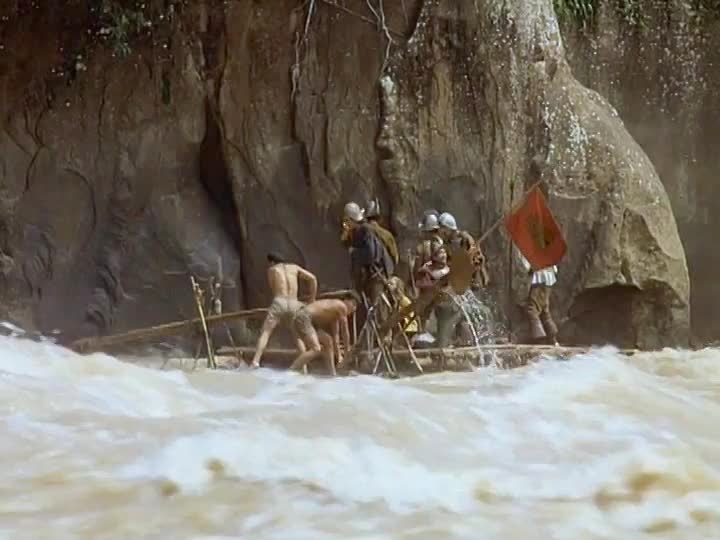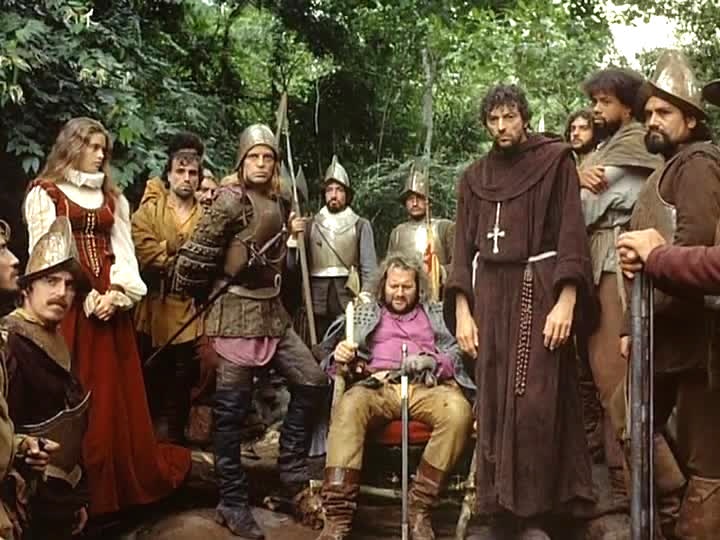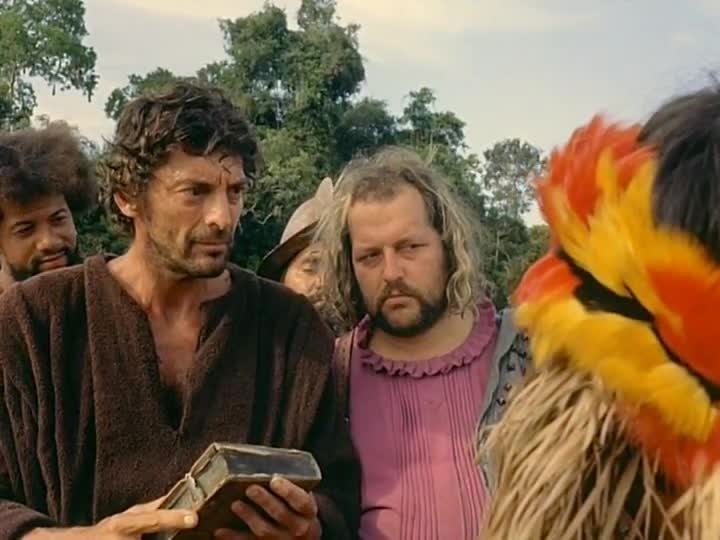On January 16, 1973, Werner Herzog’s Aguirre, the Wrath of God had its world premiere—on television. It’s hard to believe, but Aguirre first appeared on the small screen and in black and white. With this interview, published in a West German newspaper with national circulation, the young journalist, political commentator and film historian Peter Schumann offered audiences a larger, more colorful vision of Herzog’s film, in hopes that they might be able to see it on the big screen too. A member of the selection committee for the Berlin International Film Festival, Schumann had encountered Herzog’s work before. In 1968, Signs of Life won the German Film Prize and a Silver Bear for best debut film. The following year, Herzog organized a free alternative to the Berlinale in a working-class district of the city, showing festival films at no charge for people who wouldn’t ordinarily encounter independent and off-beat movies such as his own (for more on this episode, see Werner Herzog: Interviews). But before Aguirre ever played in German theaters, it ran for twenty months straight in Paris. What Schumann’s interview could not anticipate is how Herzog’s film would resonate—how it continues to find audiences far and wide on screens both big and small.
Editor’s note: This interview by Peter Schumann, “Südamerikanische Erfahrungen: Ein Gespräch mit Werner Herzog über seinen Film Aguirre, der Zorn Gottes,” Frankfurter Rundschau, January 13, 1973, was translated by Eric Ames and is reprinted by permission here and in Ames’ Werner Herzog: Interviews, a new book in print available from University Press of Mississippi and soon also available as an e-book.
Peter Schumann: Werner Herzog, how does a West German filmmaker come to make a feature film about colonial history in Latin America, above all in the jungle, moreover with Klaus Kinski?
Werner Herzog: That has to do with the history of the film, with its story, which takes place in Peru in the sixteenth century and deals with the search for El Dorado, the land of gold. To be authentic, I had to go to Peru, to the original locations. So pre-production was intensive. I was in Peru for half a year, scouting parts of all the major tributaries of the Amazon. I looked for rapids that were the most spectacular, but not too dangerous to cross with the cameras, with several hundred people, and with all the props, rafts and horses. I found some unbelievably beautiful locations. Some of the most beautiful parts of Peru are in my film.
Schumann: Why such a historical topic, one that the Latin Americans themselves have yet to address?
Herzog: That isn’t entirely true. The Brazilians, for example, have made a whole series of films about their history.
Schumann: Yes, but those are films that reach back at most to the turn of the [twentieth] century, with one exception—
Herzog: —highly political films, just like Aguirre, although it takes place around 1560. And yet, as a theme, this horde of imperialistic adventurers performing a great historical failure, this failure of imperialism, of the conquerors, the theme is really quite modern. The method by which history was then made is actually one that can still be found today in many Latin American countries. History there is staged as theater, with theatrical coups. Think of the banana republics and their dictators. What’s fascinating is that their theater tricks made world history. And even [Hernán] Cortés, as far as I know, thought of himself as staging history. He took historical examples like Alexander the Great and tried to stage history accordingly.
Schumann: Weren’t you afraid of the difficulties, which scare even the natives, when you think of the jungle there?
Herzog: You know, I’ve filmed in Black Africa, and during the shoot I was jailed five times in a row, I had malaria, we almost died—nothing scares me anymore, neither a jungle nor a Klaus Kinski, nor costumes, nor being with hundreds of Indians. There were in fact extraordinary difficulties, financial problems too. When you see the film, it looks as though it must have cost $2 million to make. But it cost maybe a tenth of that.
Schumann: An extraordinary achievement, logistically as well as physically.
Herzog: I’m quite proud of it.
Schumann: Did you finance the film yourself?
Herzog: Generally speaking, yes. German television made a small advance contribution, but I’m the sole producer. There was a very small investment by a private source in Peru, and an even smaller one by an American distributor.
Schumann: An underdeveloped cinema such as that of Peru helps a developed one further develop?
Herzog: I’d put it this way: there’s actually no real involvement. The Peruvian film industry, as it relates to projects like this one, has yet to emerge. In that regard there were no real partners.
Schumann: In Peru, did you find support or opposition from government officials?
Herzog: The Peruvian army supplied us with an amphibian aircraft and set up a small radio station, so that we always had contact with the nearest bigger city, assuming the electricity didn’t fail.
Schumann: You filmed with several hundred people? Where did they all come from?
Herzog: Mostly from Latin America. Ninety-five percent of the extras were Peruvians. And a fifteen-year-old Peruvian girl from Lima played one of the main roles. Then we had around 250 highland Indians from a co-op not far from Cuzco. These Indians made extraordinary contributions to the film, because they always worked with joy even under the most difficult conditions, and they represented the fate of their people in an unusual way [that is, by making a film]. And that’s how they understood it. All the Spanish adventurers were played by people from the Cuzco area, the wildest people I could find anywhere. One of the main actors is a very well-known Mexican, Helena Rojo. Then there are two Brazilians, one of whom is a very famous director, Ruy Guerra. For me, he’s one of the five most important filmmakers in the world right now and a terrific actor as well. Two Americans, one of them played the lead in Dennis Hopper’s film, The Last Movie. In all, we had four hundred people from fifteen countries thrown together, though of course that number decreased over time.
Schumann: Wasn’t it decimated by the production?
Herzog: Luckily, no. We were pretty well prepared for everything. The greatest danger was actually the rapids.
Schumann: And Klaus Kinski, presumably?
Herzog: Yes, he was much more dangerous. The man is actually crazy. One evening, one of the extras spoke too loudly in his house—we had to build a whole village, to house everyone—and Kinski got so worked up that he took his Winchester and shot a hole through the roof.
Schumann: So Kinski was armed?
Herzog: Yes, he was the only one, but probably more for fun. He was outfitted with a half-ton of equipment, as if he were on a big expedition.
Schumann: And how did you get along with him as an actor?
Herzog: Let me put it this way: Kinski is a very difficult man. His behavior was impossible, and he raved like a lunatic at least once a day. He also wanted to leave the set—for him, that wasn’t new—he wanted to go home. So I threatened him with his life. He saw that I was serious, that I really would have killed him. From then on, everything went very smoothly. But that shouldn’t really interest you. Only that which you see on the screen should interest you. And there you’ll see a totally new Kinski, a very domesticated, well behaved and yet very dangerous Kinski. To his credit I also have to say that he worked for a much lower fee than usual, out of pure fascination for the role and for the script.
Schumann: I want to come back to the support by the Peruvian government. Was it contingent on any copies of the film? Did you have to submit the script for review?
Herzog: A big panel of officials read the script in advance and was extraordinarily moved by the story. The Peruvians currently have a rather unusual form of state: It is a military dictatorship, but a liberal one that has nationalized certain industries—the banks and oil companies of the Americans—and [enacted] a huge land reform, with confiscations from large private owners. They noticed very clearly that my story revolves around the same problem of identity for the Peruvian people, the identity they’re searching for, as well. How do you shake off the last vestiges of this imperialism, of Spanish conquest, to achieve a sense of ‘Peruvianness.’ And that’s the theme of my film. It shows that the strong and the enduring are the Indians and their culture.
Schumann: Do you want to show this film now in Peru and in other Latin American countries, where the same problems exist?
Herzog: I’d rather show the film there than I would in Germany, because it fits there much better than it does here. Quechua, for example, is spoken in the film, and it remains in the German version too. It is a film that’s largely meant for Latin America. But the topic may be of interest everywhere. It’s also a film that’s meant to be understood as a ‘movie.’ It’s thrilling, it shows unusual locations and there’s lots of action.
Schumann: So it’s an anti-Herzog film?
Herzog: At any rate, it’s my first film that will be more widely accepted. None of the others found a larger audience; they remained in the circles of cinephiles.
Eric Ames is professor of German and a member of the cinema studies faculty at the University of Washington. He is the author of Ferocious Reality: Documentary according to Werner Herzog and Carl Hagenbeck’s Empire of Entertainments.

